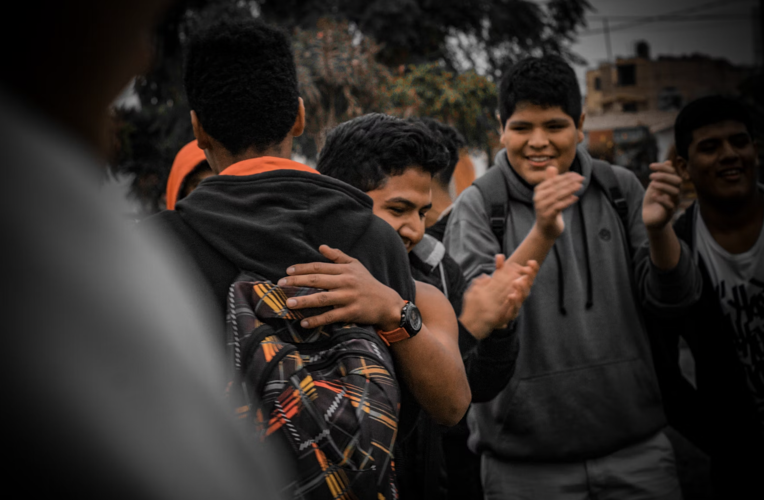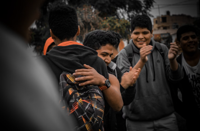
Los Angeles County has the largest concentration of foster youth in the United States, with more than 30,000 children in foster care. Photo courtesy of Paul Quispe.
Elizabeth Muñoz, 24, lived in 20 foster homes as a kid, a youth and a young adult.
“I never really knew what it was like to be a child or to experience a true childhood,” Muñoz, originally from Inglewood, told CALÓ News.
She landed in the foster care system at 11 years old after she testified against her abusive father. “I reported my father at the age of 11 for sexually assaulting me and sodomizing me,” she said. “Even though a lot of my family members turned a blind eye or a blind ear to the abuse, I knew, even at that time, that it was not OK. I told on my father and I made a lot of my family members not want anything to do with me.”
Muñoz said she found herself lost and alone in a system that she did not know how to navigate. A system she referred to as “corrupt.”
“The foster care system is very corrupt. It feels as if you're just a number. There wasn't real care and compassion,” she said. “I went to foster homes and met foster parents whose real intentions to help children were not based on care but on the money they received for housing young people like me. Of course, there were some great foster parents, but by the time I met them, I had already gone through so many years of instability and trauma within the system that I could not see the good at the time. ”
Los Angeles County has the largest concentration of foster youth in the United States, with more than 30,000 children in foster care. The majority of them, or approximately 28,000 of these children, are in the care of the L.A. County Department of Children and Family Services (DCFS).
Although the county's foster care program and the initiatives it overlooks are meant to ensure that all youth in foster care have safe, stable and appropriate housing and necessary supportive services and transition planning tailored to meet their individual needs, a lawsuit claims that the county is falling short in the treatment and care of foster youth, many of whom come from low-income communities of color.
As previously reported by CALÓ News, the lawsuit dates back to August 2023 and was filed on behalf of seven young people in foster care, ages 16-21.
The lawsuit claims that the county, DCFS and state of California are failing to fulfill their legal obligations to protect and provide adequate housing and necessary support services like mental health care and case management to older foster youth, also referred to as “transition-age youth.”
Social workers call for changes
According to Muñoz, the foster system's shortcomings are not just reflective of the youth that fall into it but also of the workers who work within the DCFS, specifically social workers.
Throughout the year, social workers have advocated for better conditions.
In 2023, about 200 L.A. County social workers demonstrated in front of county headquarters in downtown L.A., demanding that their contract be reopened to improve working conditions by reducing their caseloads.
Members of the SEIU 721, representing 4,000 social workers, were asking for the county to reduce caseloads to approximately 15 cases per social worker in order to process cases more quickly and protect families and children. Many of them were social workers handling cases that involved transferring children from foster care into permanent housing. These adoption social workers can be assigned up to 55 cases per worker, according to David Green, SEIU Local 721 union president.
According to DCFS, in 2023, L.A. County’s Child Protection Hotline assessed more than 193,000 child abuse and neglect allegations, which resulted in more than 42,000 emergency response investigations.
The same year, the L.A. County Board of Supervisors approved a $46.7 billion budget that added 123 new staff positions to DCFS to help reduce caseloads.
Despite this, burnout and heavy caseloads are not unfamiliar to DCFS case managers.

Elizabeth Muñoz, 24, lived in 20 foster homes as a kid, a youth and a young adult. Photo courtesy of Elizabeth Muñoz.
“The social workers that I dealt with, they were tired, they were drained and you could tell,” Muñoz said. “I believe a good foster home or a good foster care support system would start with a social worker who's not overworked, underpaid, or desensitized.”
The lawsuit specifically focuses on transition-age foster youth because, as Molly Mauck, an attorney with Public Counsel, one of the law firms and groups representing the plaintiffs in the lawsuit, said, transition-age youth (18-24) are often the ones pushed to the curb as they get older.
“The primary goal of the lawsuit, too, is to prevent these young people from falling off a metaphorical cliff when they turn 18,” Mauck said. “At this age is when youth require the most help and assistance, yet this is when [the system] turns its back on them. Young people entering adulthood require ongoing support and that is widely understood; for example, parents don't stop caring for their children at 18, right? The care continues.”
“Systemic failure” is what Rachel Stein, also an attorney for Public Counsel, calls the county’s treatment of older foster youth.
“It's been very disappointing and concerning that the county and state are sort of issuing their responsibilities to young people, older foster youth. The county takes the position that they do not have a special relationship with those youth, that they don't owe them the duty to protect their basic needs, when they do,” Stein said. “Today more than ever, we need to hold government agencies accountable when they violate the rights of vulnerable communities who they're charged with protecting.”
The lawsuit now continues after last year's Judge John Kronstadt's ruling helped the lawsuit move forward after he affirmed that transition-age youth care is, in fact, the responsibility of L.A. County and the state.
Kronstadt’s decision highlighted that the government’s “special relationship does not automatically terminate when a foster youth becomes 18 years old.”
For many young people, turning 18 years old can be a time of worry and instability, as many end up homeless due to the inability to secure housing assistance or government assistance.
Foster to homeless pipeline
In L.A. County, there are an estimated 3,277 young people experiencing homelessness on any given night, according to the 2024 Los Angeles Youth Count.
This figure represents individuals who are considered "transition age youth," the same group of youth who the lawsuit alleges are often neglected.”
Muñoz was part of the homeless youth population after she became a mother at age 15.
”Because I was so severely abused, I really was seeking love and I was going on the internet thinking someone would rescue me from the system I was in and all the family trauma I had experienced, and so I met a person online that would then become very abusive,” she said. “And even though I didn't know what I was doing, I didn't know what was going to happen. I knew that my child didn't deserve the traumatized version of me and I decided to keep the child, ultimately, in hopes that I would do a better job as a mother than what I've been through.”
Yet the road was not easy. She later experienced two years of homelessness and lost custody of her child, all while navigating the system alone.
“We know that expecting parents or youth who already are parents oftentimes are not able to access some of the county’s shelter programs. The county and the state have not implemented adequate due process protection for young people that would give them a real chance at a stable future,” Stein said.
Cherry-picking youth
The lawsuit also argues that the young parents within the foster care system are not the only youth that the county fails to place in stable housing. Arbitrary application and termination procedures, as well as outdated policies and barriers, also make it difficult for youth with mental health disabilities to be victims of placement instability.
Mauck and Stein said youth dealing with mental health disabilities are often some of the ones who wait the longest to receive stable housing.
“There's a lot of disability discrimination where transitional housing providers often cherry-pick youth who do not have mental health needs during the application process and deny the applications of young people who do disclose mental health needs or disclose they take mental health medication during the application process,” Stein said.
While Muñoz was in foster care, she was prescribed medication for depression and anxiety.
“I was severely depressed. My father always told me that everything that was happening to me and what he was doing to me was my fault. After years, that was ingrained in me and I genuinely thought that everything I was going through was my fault. For a long time, I struggled with self-blame,” she said. “The medication that I was prescribed was for major depressive disorder. I was cutting at the age of 13. I was in and out of mental hospitals.”
Mauck said that mental health disorders are not unusual among foster youth. “Youth in foster care have experienced the trauma of being separated from their families, of being assaulted and of losing those social ties and often experience additional trauma while in care.”
One of the other youth in the lawsuit includes Onyx G., a seventeen-year-old, Black and Latina currently in foster care in L.A. County. Onyx G. turns eighteen imminently, when she will become a nonminor dependent by operation of law. She intends to enter extended foster care in L.A. County. Rosie S. is also a plaintiff in the case. She is a twenty-year-old Latina young person and an expecting mother.
She has been temporarily living in Las Vegas, Nevada, for the last nine months because, as the lawsuit stated, DCFS has not yet moved her to a safe, stable and appropriate placement in Los Angeles.
Apart from Public Counsel, the plaintiffs are also represented by the Alliance for Children’s Rights, Public Counsel, and Children’s Rights – and pro bono law firm Munger, Tolles & Olson LLP.
“Now more than ever, we need to hold government agencies accountable when they violate the rights of vulnerable communities, like youth, who they're charged with protecting. By denying transition-age youth the housing and crucial services they're entitled to, the state and the county are sending this message to our clients and the other young people who are similarly situated: that their care is a responsibility that the government would rather just wash its hands of," Stein said.
Today, Muñoz is out of the foster care system. She lives in L.A. and is a mother of three kids, who she has full custody of. She is pursuing higher education to become a social worker.
“My kids, they're all home. They're very happy and right now they're just being kids; that's all that they need to be right now,” she said.













(0) comments
Welcome to the discussion.
Log In
Keep it Clean. Please avoid obscene, vulgar, lewd, racist or sexually-oriented language.
PLEASE TURN OFF YOUR CAPS LOCK.
Don't Threaten. Threats of harming another person will not be tolerated.
Be Truthful. Don't knowingly lie about anyone or anything.
Be Nice. No racism, sexism or any sort of -ism that is degrading to another person.
Be Proactive. Use the 'Report' link on each comment to let us know of abusive posts.
Share with Us. We'd love to hear eyewitness accounts, the history behind an article.